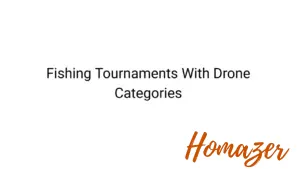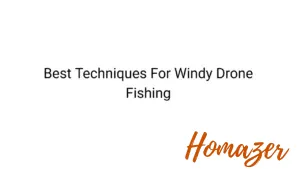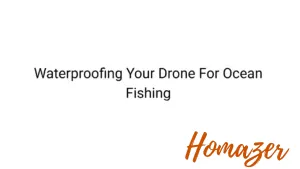Have you seen those incredible videos of people fishing from drones, dropping baits right where the fish are? It looks super cool, right? But before you start thinking about rigging up your own drone for a fishing trip in Tennessee, there’s a really important question to answer: Is drone fishing legal in Tennessee? Getting the answer to this question can save you from a lot of trouble. This guide will walk you through everything you need to know about the rules and regulations surrounding drones and fishing in the Volunteer State. You’ll explore what’s allowed, what’s not, and what to keep in mind. You’ll gain a clear picture, which will significantly improve your time on this page and help you avoid a quick bounce! Let’s explore!
Drone Regulations and Tennessee Waters
Before you even think about attaching a fishing line to your drone, you need to be aware of the general drone laws in Tennessee. These rules are put in place by both the Federal Aviation Administration (FAA) and the Tennessee Wildlife Resources Agency (TWRA) to protect the public and the environment. You have to keep in mind that a drone is an aircraft, and it’s subject to many of the same rules and regulations that govern airplanes and helicopters.
This section will explore the fundamental laws related to drone operations within the state of Tennessee, laying a strong foundation for a deeper examination of the legality of drone fishing. It’s about ensuring your drone flights are safe and don’t break any rules.
FAA Rules for Drone Operation
The FAA sets the baseline rules for all drone operators in the United States. These rules cover things like where you can fly, how high you can fly, and how to register your drone. The FAA’s regulations are designed to prevent accidents and keep the airspace safe for everyone. Failing to follow these rules can lead to significant penalties, including fines and potential legal action. The FAA’s rules apply everywhere, regardless of whether you’re fishing or just taking photos.
- Registration: All drones weighing more than 0.55 pounds (250 grams) must be registered with the FAA. This provides a way to track the drone and its owner if something goes wrong. Registration is a straightforward process completed online.
- Flight Restrictions: You cannot fly your drone in restricted airspace, near airports, or above people. There are specific rules about flying over populated areas or near sensitive infrastructure like power plants.
- Visual Line of Sight (VLOS): You must always keep your drone within your visual line of sight. This means you must be able to see your drone with your own eyes without the aid of binoculars or other devices. This is a very important rule.
- Altitude Limits: The general rule is to fly your drone no higher than 400 feet above the ground. This altitude limit helps to avoid conflicts with manned aircraft.
Violating FAA regulations can lead to serious consequences, and that’s why you have to keep them in mind. If the FAA catches you breaking the rules, it can issue a fine. It may also suspend or revoke your drone pilot certificate (if you have one). In some instances, violations can also result in federal prosecution. That’s why it’s very important to follow the rules.
TWRA Regulations Related to Drone Usage
The Tennessee Wildlife Resources Agency (TWRA) is the state agency responsible for managing the state’s fish and wildlife resources, which includes regulating fishing activities. The TWRA also has rules about using drones, especially when they are connected to fishing activities. They want to protect the animals and make sure that fishing is done in a responsible way. Their rules might impact what you can do with a drone when you’re near water, and how you go about fishing. It is important to know that, even if the FAA says it’s okay, the TWRA might have different rules.
- Wildlife Harassment: The TWRA prohibits using drones to harass or disturb wildlife. This means you can’t fly your drone to chase or scare animals, including fish, birds, or mammals.
- Fishing Regulations: The TWRA has regulations about fishing methods, and it’s important to know whether using a drone to drop your line counts as a legal fishing method. This includes the types of gear allowed, the areas where you can fish, and the times when fishing is permitted.
- Waterway Restrictions: The TWRA might have specific restrictions about drone use near certain waterways or protected areas, such as state parks or wildlife refuges. These restrictions could be in place to protect sensitive habitats or wildlife.
- Permits: In some cases, you might need a permit from the TWRA to use a drone for specific activities related to wildlife management or research. This could involve surveys or other activities that might require special authorization.
Understanding these TWRA regulations is key to staying on the right side of the law. Failing to comply can result in fines, the loss of your fishing privileges, or other penalties. You have to respect wildlife and the environment. You also have to respect the safety of others.
Is Drone Fishing Legal in Tennessee? The Specifics
So, the big question: is drone fishing legal in Tennessee? The answer isn’t a simple yes or no. It’s more complex, and it depends on a few different factors, including the specific regulations in place. You need to understand the current TWRA laws. The legality often comes down to how you’re using the drone and what you’re doing with the fishing line. You can’t assume that because you have a drone, you can use it to fish.
This section explores whether drone fishing is permissible within the scope of Tennessee’s laws. It dives into the interpretations and current guidelines. This will help you know whether you can safely enjoy drone fishing, while staying within the legal requirements.
Current TWRA Position on Drone Fishing
The TWRA’s stance on drone fishing is critical to whether or not you can engage in this activity. As of the latest information, drone fishing isn’t explicitly permitted in Tennessee. You’ll typically find that if a method of fishing is not specifically allowed by the TWRA, then it is automatically not allowed. This is because the regulations are designed to protect the state’s fish and wildlife resources. To find the most up-to-date and specific guidance, always check the TWRA’s official website or contact them directly.
- Fishing Methods Restrictions: The TWRA regulations carefully detail the accepted methods of fishing, which typically involve traditional gear. They specify things like the type of rod, reel, line, and bait you can use. Drone fishing doesn’t fit into these traditional categories.
- Unapproved Fishing Methods: Because drone fishing involves a unique approach, it’s generally considered an unapproved fishing method. This is because the drones themselves are not traditional fishing gear. The rules don’t include the equipment or techniques required for drone fishing.
- Potential for Violations: Attempting to use a drone for fishing could lead to a violation of existing fishing regulations. This could result in fines or other penalties.
- Evolving Regulations: Regulations regarding drone use and fishing are always in a state of change. That is why it’s very important to keep up-to-date with any new rules or guidelines that the TWRA may put in place.
Because the TWRA has not specifically approved drone fishing, engaging in it could lead to legal problems. It’s very important to understand that the rules are designed to protect the state’s natural resources and ensure fair and ethical fishing practices. Always abide by the rules. Contact the TWRA to find the latest information.
Interpreting the Regulations: What’s Allowed?
While explicit approval is lacking, you should consider what is, and is not, permitted. This helps you understand how the current regulations apply. You have to carefully consider the specifics of the situation. Some drone use might be acceptable, while other actions may be in violation of the regulations. This is why you need to know the rules, and you have to apply them carefully.
- Drone Use for Observation: You are generally allowed to use a drone to observe the water and fish. You can use it to survey an area, as long as you’re not interfering with the fish or fishing activities. This doesn’t violate any specific fishing rules.
- No Fishing Gear Attached: You can fly a drone over water as long as it doesn’t have any fishing equipment attached. You can’t use it to drop bait, lines, or lures. The key is to not use the drone directly to catch fish.
- Compliance with General Drone Laws: All drone use must comply with the general rules set by the FAA and the TWRA. This involves keeping your drone in sight, flying at appropriate altitudes, and staying away from restricted areas.
- Permits for Research or Management: In some cases, the TWRA may issue permits for drone use in the management or study of wildlife resources. If you have research goals, you could potentially apply for a permit, but this is a very specific situation.
You can use drones, but be aware of how you are using the drone. If you are using the drone to fish, you might run into problems. Always follow the rules. It’s important to respect both the spirit and the letter of the law.
Potential Risks and Penalties of Unlawful Drone Fishing
Violating the rules about drone fishing can bring a number of risks. You need to consider the potential consequences. They can range from fines to the loss of fishing privileges, and in severe cases, even legal action. It’s important to understand the penalties involved. It is also important to respect the rules, even if you are not entirely sure what the rules are.
- Fines: The most common penalty for violating fishing regulations, including those related to drone fishing, is a fine. The amount can vary depending on the specific violation and the severity of the offense.
- Loss of Fishing Privileges: In addition to fines, you might lose your ability to fish in Tennessee for a period of time. This can be a significant penalty for those who enjoy fishing. The loss of fishing privileges can be for a certain period of time.
- Seizure of Equipment: The TWRA can confiscate any equipment used in the violation, including the drone and any fishing gear. If your equipment is taken from you, you might have to spend time and money to get it back.
- Legal Action: In more serious cases, you could face legal charges. This can lead to court appearances and possible criminal penalties.
The potential for these penalties underscores the importance of obeying the law. Always be certain of the rules before you start fishing with a drone. It’s better to be safe than sorry, and it can save you time, money, and legal trouble.
Exploring Alternatives: Legal and Ethical Considerations
If drone fishing is not allowed, you still have some choices. There are ways to enjoy the outdoors and pursue your fishing interests, all while staying within the law. It’s about seeking out activities that are both lawful and ethically sound. This means finding methods that respect the environment and the fish, without breaking any rules.
This part of the discussion examines some of those possibilities. It is about encouraging you to enjoy fishing responsibly. This shows you how to pursue your interest in fishing without breaking any laws.
Legal Fishing Methods in Tennessee
There are many legal ways to go fishing in Tennessee. You can choose from various fishing methods, and they all comply with TWRA regulations. Each method has its own rules about equipment and when it can be used. These options provide opportunities for a successful and enjoyable fishing experience, all while respecting the law. It’s important to familiarize yourself with these methods.
- Rod and Reel: This is a very common method. You use a rod and reel with a line, hook, and bait or lure. The TWRA has specific regulations about the type of rod, reel, line, and hooks that are allowed.
- Bait Fishing: This uses natural or artificial bait on a hook, and it’s a popular method for many types of fish. The TWRA also regulates which baits are allowed and where you can use them.
- Lure Fishing: This involves using artificial lures to attract fish. There are many different types of lures available. The regulations control the type of lures you can use.
- Fly Fishing: This method uses a specialized rod, reel, and line to cast artificial flies that look like insects. There are specific guidelines for fly fishing, especially in designated fly fishing areas.
Choosing a legal method is the first step to a successful fishing trip. You should learn the rules associated with each method. That includes the specific equipment requirements, season restrictions, and other regulations that apply. Always familiarize yourself with the current TWRA guidelines before you go fishing.
Ethical Considerations for Responsible Fishing
Beyond legal requirements, there are also ethical considerations for responsible fishing. This includes thinking about your impact on the environment, the fish you’re trying to catch, and other people around you. Ethical fishing means practicing conservation and treating fish and the environment with respect. It’s all about a commitment to sustainability and enjoyment of nature.
- Catch and Release: Releasing the fish back into the water after catching it is a vital ethical practice. This helps to maintain fish populations and conserve the sport for future generations.
- Sustainable Practices: Use gear and techniques that minimize harm to the fish and the environment. This includes using barbless hooks. It also includes removing trash from fishing areas.
- Respect for Others: Be considerate of other anglers and the environment. Share the water and fishing spots responsibly.
- Conservation Efforts: Support conservation organizations and efforts to protect fish habitats. Get involved in initiatives that promote sustainable fishing practices.
By following ethical fishing practices, you contribute to the long-term health of our aquatic resources. Ethical fishing promotes responsible enjoyment of the sport. It also contributes to the conservation of fish populations for future generations. It’s about respecting the environment. It is about ensuring the long-term health of aquatic ecosystems.
Alternatives to Drone Fishing
If drone fishing isn’t an option, you can still find ways to enjoy fishing. There are many activities you can pursue that offer excitement and adventure. You can choose from a range of options that align with regulations, and provide rewarding fishing experiences. From different fishing techniques to exploring new areas, these options can make the fishing experience very satisfying.
- Traditional Fishing: Use a rod and reel or other approved fishing methods to enjoy the sport. There are many ways to catch fish. The traditional methods allow you to stay within the regulations.
- Fishing with a Boat: You can fish from a boat, which allows you to access a wide range of fishing locations. You can use different fishing methods. This also opens up the possibility of covering more water.
- Shore Fishing: You can fish from the shore, which is a great way to enjoy the outdoors. This can be done in many areas. You just need a rod, reel, and appropriate bait or lures.
- Explore Different Fishing Techniques: Experiment with different types of lures, bait, and techniques that are legal. There’s always something new to learn. Explore various approaches to fishing.
These alternatives help you stay within the law, while still having fun. You can enjoy your fishing adventure without the use of drones. Each option offers opportunities for a satisfying fishing experience. By exploring different methods, you can improve your skills and find the best ways to catch fish.
Frequently Asked Questions
Question: Is it okay to fly a drone over a lake in Tennessee if I’m not fishing?
Answer: Yes, you are generally allowed to fly a drone over a lake in Tennessee for recreational purposes, as long as you comply with FAA regulations regarding airspace, altitude, and line of sight, and the TWRA rules on wildlife. You can’t interfere with other people’s fishing activities or disturb wildlife.
Question: Can I use a drone to scout for fish and then cast my line?
Answer: While you can use a drone to observe the water and potentially locate fish, you still can’t use it to drop your fishing line or bait. You have to follow the FAA and TWRA regulations. The TWRA has not approved using drones for fishing. It might be interpreted as an unapproved fishing method.
Question: Do I need a special permit to fly a drone over a state park in Tennessee?
Answer: Yes, you usually need a permit from the Tennessee Department of Environment and Conservation (TDEC) to fly a drone over a state park. State parks have their own set of rules. You can contact them directly to find out about permits.
Question: Are there any exceptions to the drone fishing ban in Tennessee?
Answer: There are generally no specific exceptions to the drone fishing ban in Tennessee for recreational anglers. However, you should check with the TWRA for any potential exemptions, especially if the use of a drone is for scientific research or wildlife management purposes. In this situation, the TWRA may issue a permit.
Question: What happens if I get caught using a drone for fishing in Tennessee?
Answer: If you are caught using a drone for fishing in Tennessee, you could face penalties such as fines, the loss of your fishing privileges, and the seizure of your drone and fishing equipment. In very serious cases, you might face legal action. You should comply with the regulations to avoid these consequences.
Final Thoughts
So, what’s the deal with Is drone fishing legal in Tennessee? As the regulations stand, directly using a drone to fish is not allowed in Tennessee. While the allure of using a drone to improve your chances in fishing is undeniable, it is against the current rules. However, you’re free to fly your drone for observation, as long as you follow the FAA and TWRA rules. But always remember, never attach any fishing gear to your drone. You can enjoy fishing using conventional methods. You can also explore the alternatives that are available, such as using boats, fishing from the shore, or trying out different approved fishing techniques. By staying up-to-date with regulations, enjoying fishing responsibly, and embracing ethical practices, you can have fulfilling and lawful fishing experiences in Tennessee. Stay informed, respect the rules, and most importantly, have fun out on the water!





